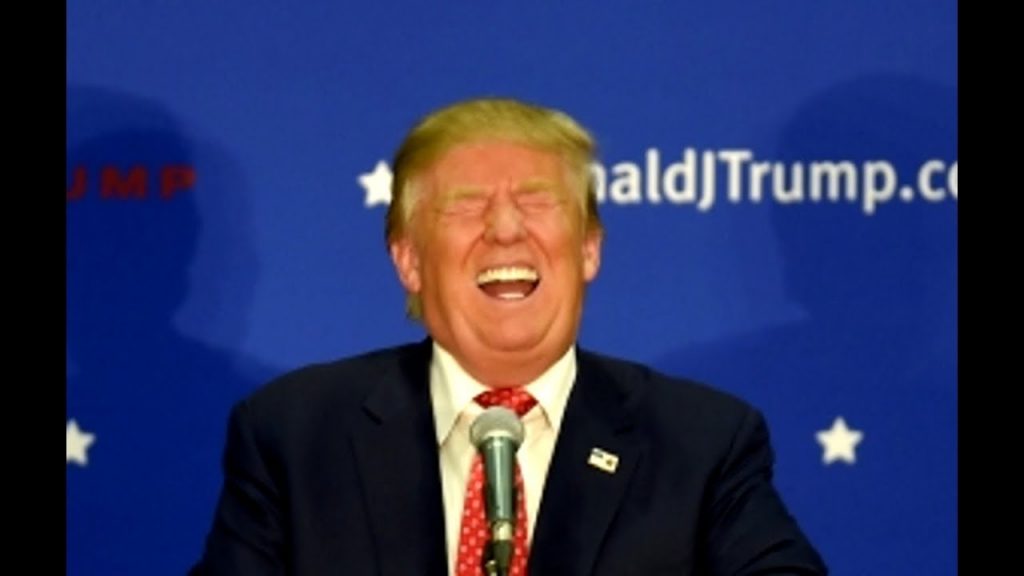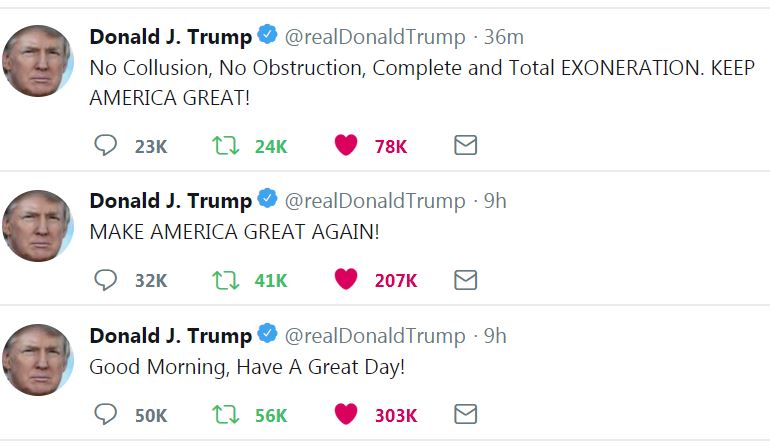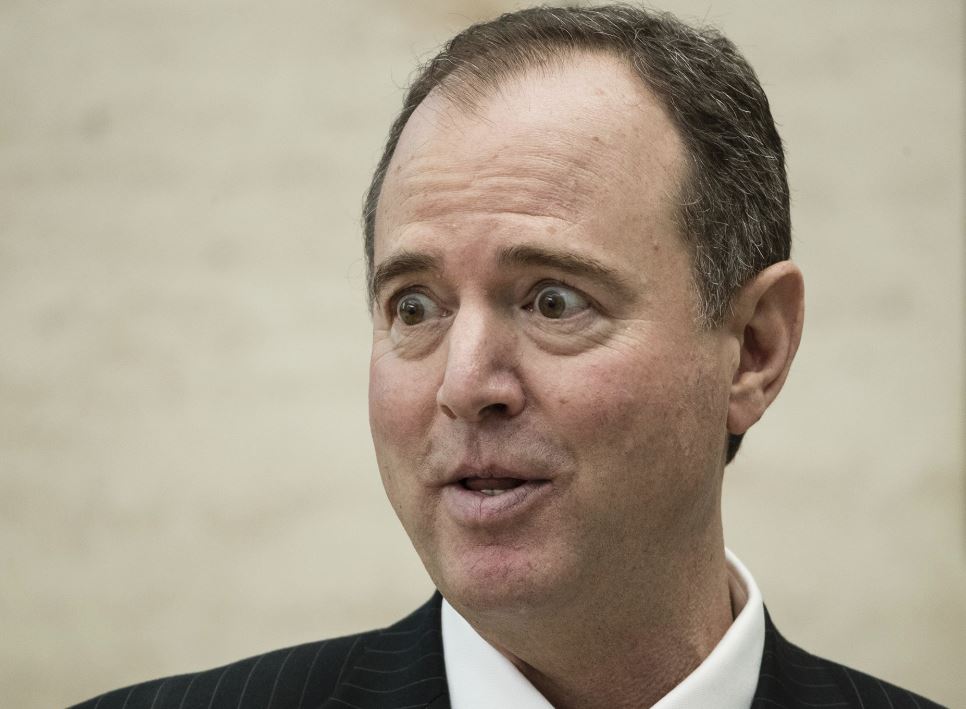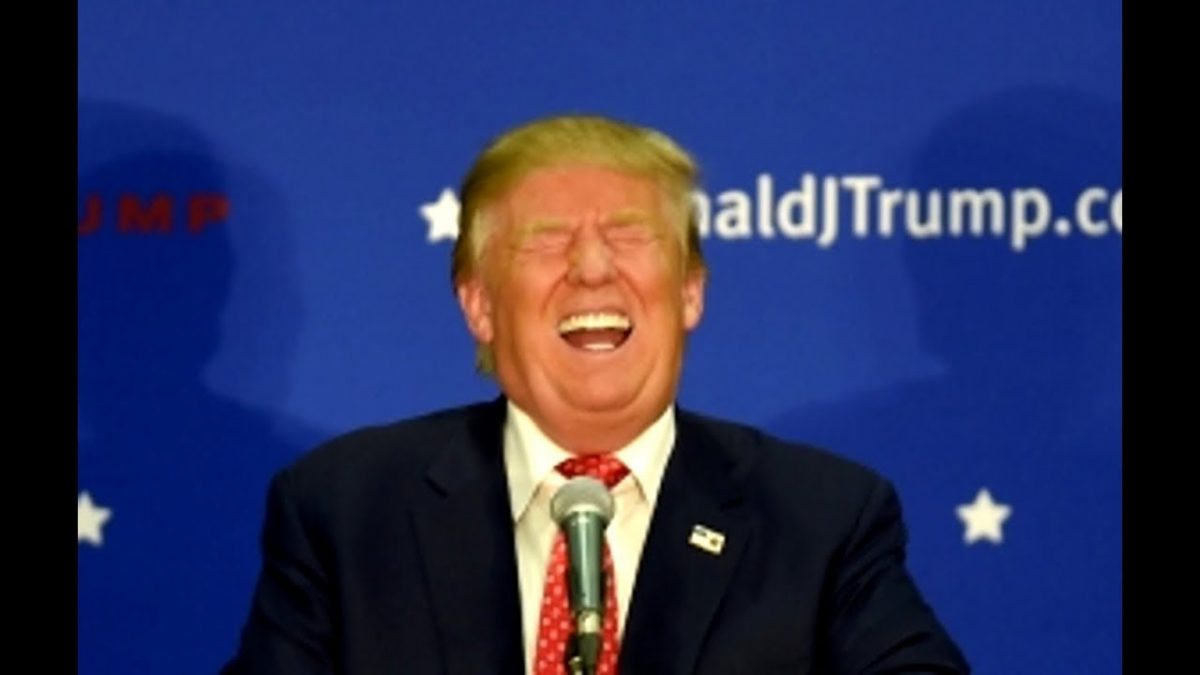没有通俄!
司法部长巴尔今天下午给国会递交了总结报告,同时向大众开放。
结论是:没有通俄。

不但川普没有通俄,川普竞选团队的任何人也没有跟俄罗斯密谋或者合作。
即使跟俄国有联系的人多次表示可以提供帮助,穆勒的结论是没有任何人选择跟俄罗斯合作或者共谋。
通俄闹剧,彻底死翘翘!飞洋在线
the Special Counsel did not find that the Trump campaign, or anyone associated with it, conspired or coordinated with the Russian government in these efforts, despite multiple offers from Russian-affiliated individuals to assist the Trump campaign.
穆勒调查的第二个结论是俄罗斯确实入侵了希拉里和民主党的电脑,盗窃了大批邮件,广泛传播试图影响美国大选,包括通过维基解密扩散。另外俄罗斯的一个组织IRA,在社交网站上发帖试图干涉大选。穆勒也因此指控了一批俄罗斯人,主要是网络水军,也包括几个军方人物。不过这些已经被大量报道,早就不是新闻了。穆勒的结论是没有证据表明任何美国公民在协助他们。
第三个结论是有关妨碍司法的调查,穆勒的结论是没有结论。既不认为川普妨碍了司法调查,也不为他澄清。仅仅这一条,就能让媒体继续兴奋下去:难道你是再说,还是有一点点犯罪的可能?
巴尔的总结报告说,他和副部长罗森斯坦商量之后一致认为,穆勒呈递的证据不足以表明川普总统妨碍了司法。飞洋在线
Deputy Attorney General Rod Rosenstein and I have concluded that the evidence developed during the Special Counsel’s investigation is not sufficient to establish that the President committed an obstruction-of-justice offense.
注意,罗森斯坦曾经提议他偷偷带上窃听器,骗过白宫的安检,从而监听川普。当然后来被FBI曝光之后,他坚持说自己是开玩笑。
根据穆勒的调查报告,司法部长巴尔已经表示,不会提起指控。
所以,无论从哪个角度看,今天的消息对川普来说就是完胜。
果然,憋了整整两天,打了一场高尔夫球之后,老川今早先发了两推,早上好!让美国再次伟大。
等到下午总结报告出炉之后,又发了第三推,受了两年的恶气,喷薄而出:

接下来怎么办?
穆勒调查是最全面,最具体的:
- 19个(民主党)大牌律师;
- 40个FBI侦探和情报局专家;
- 2800张传票;
- 500个搜查令;
- 13次向外国政府索要证据;
- 面试了500多证人;
- 耗时675天;
- 花费3000万美元。
最后证明了川普是清白的。
而且穆勒调查已经是第四次:
1. 早在去年,众议院的通俄调查已经结束了,结论是没有通俄。
2. 今年早些时候,参议院两党联合调查,结论是没有通俄。
3. 穆勒之前,FBI就已经调查了9个月,同样没有找到通俄的证据。
对于普通选民来说,你觉得结论应该是什么,没有通俄对吧?
但是民主党政客宣称,调查还是不够全面,发誓要继续调查下去。
整整两年,穆勒被民主党捧为天神,纷纷要立法保护穆勒,每次有个变动,比如塞申斯被开除,代理司法部长上任,以及巴尔通过参议院听证,保护穆勒调查都是首要任务。
整整两年,民主党的Adam Schiff等人频繁上镜,斩钉截铁,一口咬定川普通俄,而且声称他有足够的证据。这个人现在可是众院情报委员会的主席,即使是共和党掌控众院的时候,他也一直是情报委员会成员。也就是说,国会面试的所有证人,国会搜集的所有情报,国会掌握的所有信息,他都能看到。在这种情况下,他仍然面向全国观众,口口声声说他有川普通俄的证据。
就像Tucker Carlson所说,他在电视上公开撒谎,整整两年!

那么现在,你觉得他会难堪吗?会道歉吗?会被法办吗?
不但不会,还会变本加厉。
这两天媒体已经悄悄改了口风:不能完全相信穆勒,他可能掩盖了啥东西。穆勒调查不是结束,而是一个新的开始。无论穆勒的结果如何,川普的麻烦还多着呢。
无话可说,继续看戏,看看还能折腾出什么来。
司法部长巴尔的总结报告全文
On Friday, the Special Counsel submitted to me a “confidential report explaining the prosecution or declination decisions” he has reached, as required by 28 C.F.R. § 600.8(c). This report is entitled “Report on the Investigation into Russian Interference in the 2016 Presidential Election.” Although my review is ongoing, I believe that it is in the public interest to describe the report and to summarize the principal conclusions reached by the Special Counsel and the results of his investigation.
The report explains that the· Special Counsel and his staff thoroughly investigated allegations that members of the presidential campaign of Donald J. Trump, and others associated with it, conspired with the Russian government in its efforts to interfere in the 2016 U.S. presidential election, or sought to obstruct the related federal investigations. In the report, the Special Counsel noted that, in completing his investigation, he employed 19 lawyers who were assisted by a team of approximately 40 FBI agents, intelligence analysts, forensic accountants, and other professional staff. The Special Counsel issued more than 2,800 subpoenas, executed nearly 500 search warrants, obtained more than 230 orders for communication records, issued almost 50 orders authorizing use of pen registers, made 13 requests to foreign governments for evidence, and interviewed approximately 500 witnesses.
The Special Counsel obtained a number of indictments and convictions of individuals and entities in connection with his investigation, all of which have been publicly disclosed. During the course of his investigation, the Special Counsel also referred several matters to other offices for further action. The report does not recommend any further indictments, nor did the Special Counsel obtain any sealed indictments that have yet to be made public. Below, I summarize the principal conclusions set out in the Special Counsel’s report.
Russian Interference in the 2016 U.S. Presidential Election. The Special Counsel’s report is divided into two parts. The first describes the results of the Special Counsel’s investigation into Russia’s interference in the 2016 U.S. presidential election. The report outlines the Russian effort to influence the election and documents crimes committed by persons associated with the Russian government in connection with those efforts. The report further explains that a primary consideration for the Special Counsel’s investigation was whether any Americans -including individuals associated with the Trump campaign – joined the Russian conspiracies to influence the election, which would be a federal crime. The Special Counsel’s investigation did not find that the Trump campaign or anyone associated with it conspired or coordinated with Russia in its efforts to influence the 2016 U.S. presidential election. As the report states: “[T]he investigation did not establish that members of the Trump Campaign conspired or coordinated with the Russian government in its election interference activities.”1
The Special Counsel’s investigation determined that there were two main Russian efforts to influence the 2016 election. The first involved attempts by a Russian organization, the Internet Research Agency (IRA), to conduct disinformation and social media operations in the United States designed to sow social discord, eventually with the aim of interfering with the election. As noted above, the Special Counsel did not find that any U.S. person or Trump campaign official or associate conspired or knowingly coordinated with the IRA in its efforts, although the Special Counsel brought criminal charges against a number of Russian nationals and entities in connection with these activities.
The second element involved the Russian government’s efforts to conduct computer hacking operations designed to gather and disseminate information to influence the election. The Special Counsel found that Russian government actors successfully hacked into computers and obtained emails from persons affiliated with the Clinton campaign and Democratic Party organizations, and publicly disseminated those materials through various intermediaries, including WikiLeaks. Based on these activities, the Special Counsel brought criminal charges against a number of Russian military officers for conspiring to hack into computers in the United States for purposes of influencing the election. But as noted above, the Special Counsel did not find that the Trump campaign, or anyone associated with it, conspired or coordinated with the Russian government in these efforts, despite multiple. offers from Russian-affiliated individuals to assist the Trump campaign.
Obstruction of Justice. The report’s second part addresses a number of actions by the President – most of which have been the subject of public reporting – that the Special Counsel investigated as potentially raising obstruction-of-justice concerns. After making a “thorough factual investigation” into these matters, the Special Counsel considered whether to evaluate the conduct under Department standards governing prosecution and declination decisions but ultimately determined not to make a traditional prosecutorial judgment. The Special Counsel therefore did not draw a conclusion – one way or the other – as to whether the examined conduct constituted obstruction. Instead, for each of the relevant actions investigated, the report sets out evidence on both sides of the question and leaves unresolved what the Special Counsel views as “difficult issues” of law and fact concerning whether the President’s actions and intent could be viewed as obstruction .. The Special Counsel states that “while this report does not conclude that the President committed a crime, it also does not exonerate him.”
The Special Counsel’s decision to describe the facts of his obstruction investigation without reaching any legal conclusions leaves it to the Attorney General to determine whether the conduct described in the report constitutes a crime. Over the course of the investigation, the Special Counsel’s office engaged in discussions with certain Department officials regarding many of the legal and factual matters at issue in the Special Counsel’s obstruction investigation. After reviewing the Special Counsel’s final report on these issues; consulting with Department officials, including the Office of Legal Counsel; and applying the principles of federal prosecution that guide our charging decisions, Deputy Attorney General Rod Rosenstein and I have concluded that the evidence developed during the Special Counsel’s investigation is not sufficient to establish that the President committed an obstruction-of-justice offense. Our determination was made without regard to, and is not based on, the constitutional considerations that surround the indictment and criminal prosecution of a sitting president. 2
In making this determination, we noted that the Special Counsel recognized that “the evidence does not establish that the President was involved in an underlying crime related to Russian election interference,” and that, while not determinative, the absence of such evidence bears upon the President’s intent with respect to obstruction. Generally speaking, to obtain and sustain an obstruction conviction, the government would need to prove beyond a reasonable doubt that a person, acting with corrupt intent, engaged in obstructive conduct with a sufficient nexus to a pending or contemplated proceeding. In cataloguing the President’s actions, many of which took place in public view, the report identifies no actions that, in our judgment, constitute obstructive conduct, had a nexus to a pending or contemplated proceeding, and were done with corrupt intent, each of which, under the Department’s principles of federal prosecution guiding charging decisions, would need to be proven beyond a reasonable doubt to establish an obstruction-of-justice offense.
Status of the Department’s Review
The relevant regulations contemplate that the Special Counsel’s report will be a “confidential report” to the Attorney General. See Office of Special Counsel, 64 Fed. Reg. 37,038, 37,040-41 (July 9, 1999). As I have previously stated, however, I am mindful of the public interest in this matter. For that reason, my goal and intent is to release as much of the Special Counsel’s report as I can consistent with applicable law, regulations, and Departmental policies.
Based on my discussions with the Special Counsel and my initial review, it is apparent that the report contains material that is or could be subject to Federal Rule of Criminal Procedure 6( e ), which imposes restrictions on the use and disclosure of information relating to “matter[ s] occurring before [a] grand jury.” Fed. R. Crim. P. 6(e)(2)(B). Rule 6(e) generally limits disclosure of certain grand jury information in a criminal investigation and prosecution. Id. Disclosure of 6( e) material beyond the strict limits set forth in the rule is a crime in certain circumstances. See, e.g., 18 U.S.C. § 401(3). This restriction protects the integrity of grand jury proceedings and ensures that the unique and invaluable investigative powers of a grand jury are used strictly for their intended criminal justice function.
Given these restrictions, the schedule for processing the report depends in part on how quickly the Department can identify the 6( e) material that by law cannot be made public. I have requested the assistance of the Special Counsel in identifying all 6( e) information contained in the report as quickly as possible. Separately, I also must identify any information that could impact other ongoing matters, including those that the Special Counsel has referred to other offices. As soon as that process is complete, I will be in a position to move forward expeditiously in determining what can be released in light of applicable law, regulations, and Departmental policies.
As I observed in my initial notification, the Special Counsel regulations provide that “the Attorney General may determine that public release of’ notifications to your respective Committees “would be in the public interest.” 28 C.F.R. § 600.9(c). I have so determined, and I will disclose this letter to the public after delivering it to you.
Sincerely,
William P. Barr Attorney General


